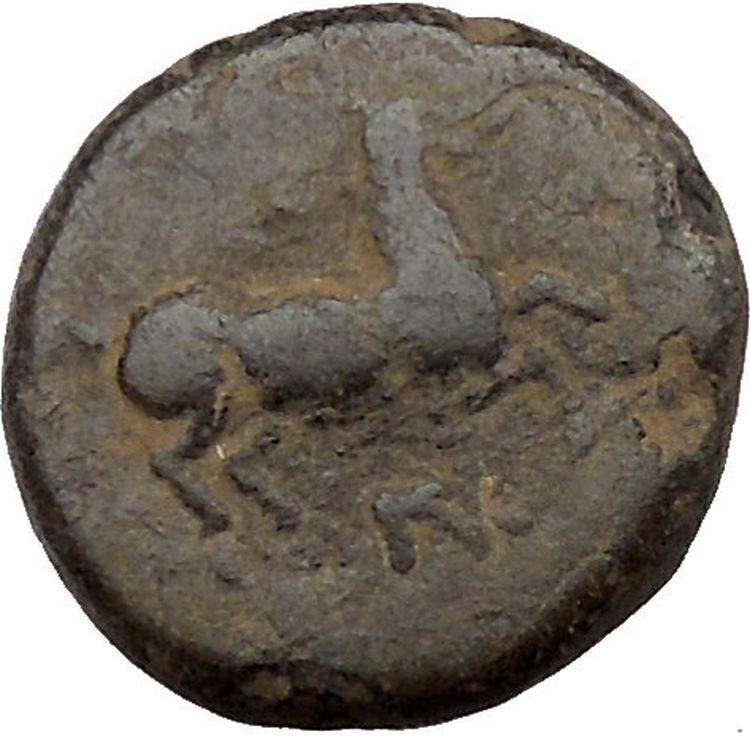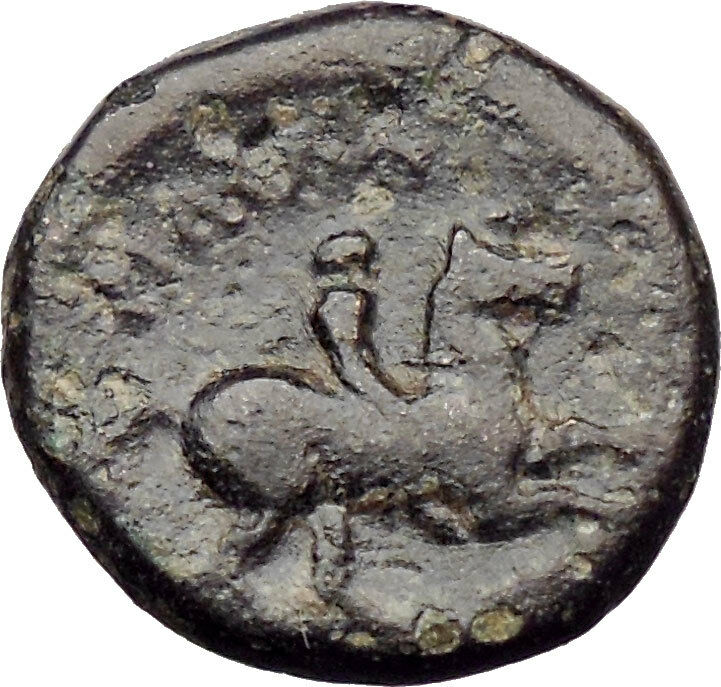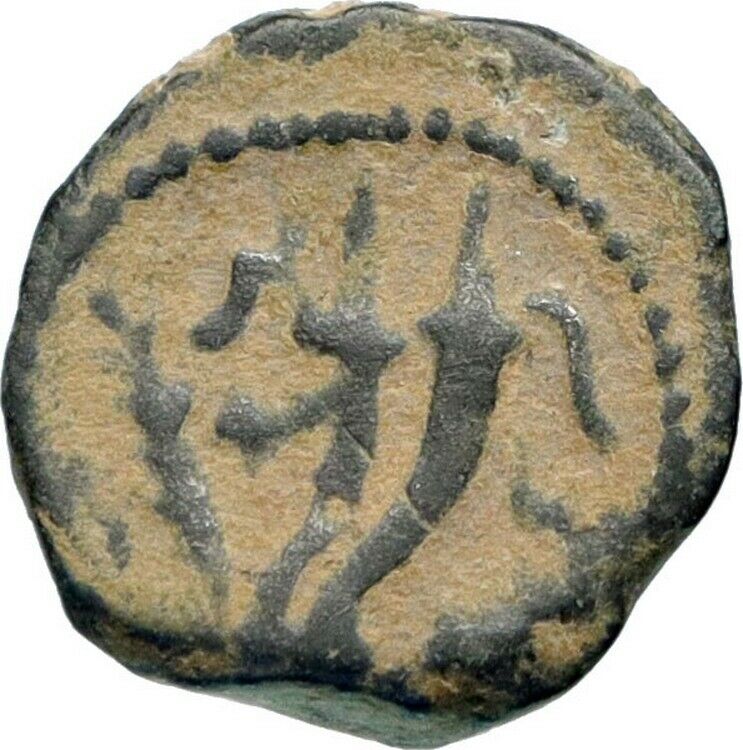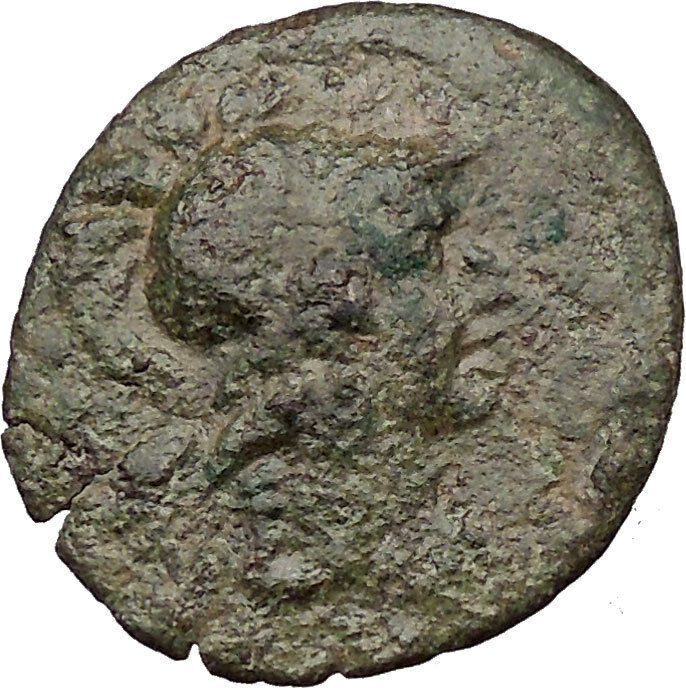|
Seleukid Empire
Seleukos II Kallinikos – King: 246-225 B.C.
Bronze 15mm (4.31 grams) Sardes mint
Reference: HGC 9, 344; SC 657
Head of Hercules right wearing lion-skin headdress.
ΒΑΣΙΛΕΩΣ /
ΣΕΛΕΥΚΟΥ either side of Apollo Delphios seated left on omphalos;
monograms to outer left and right.
You are bidding on the exact item pictured,
provided with a Certificate of Authenticity and Lifetime Guarantee of
Authenticity.

Hercules
is the Roman name for the Greek
divine
hero Heracles
, who was the son of
Zeus (Roman equivalent
Jupiter
) and the mortal
Alcmene
. In
classical mythology
, Hercules is famous for his
strength and for his numerous far-ranging adventures.
The Romans adapted the Greek hero’s iconography and myths for their
literature and art under the name Hercules. In later
Western art
and literature and in
popular culture
, Hercules is more
commonly used than Heracles as the name of the hero. Hercules was a
multifaceted figure with contradictory characteristics, which enabled later
artists and writers to pick and choose how to represent him. This article
provides an introduction to representations of Hercules in the
later tradition

In
Greek
and
Roman mythology
,
Apollo, is one of the most
important and diverse of the
Olympian deities
kouros
(a beardless youth), Apollo has been
variously recognized as a god of light and the sun; truth and prophecy;
archery
; medicine and healing; music, poetry,
and the arts; and more. Apollo is the son of
Zeus and Leto
, and has a
twin
sister, the chaste huntress
Artemis
. Apollo is known in Greek-influenced
Etruscan mythology
as Apulu. Apollo was
worshiped in both
ancient Greek
and
Roman religion
, as well as in the modern
Greco
–Roman
Neopaganism
.
As the patron of Delphi
(Pythian Apollo), Apollo was an
oracular
god — the prophetic deity of the
Delphic Oracle
. Medicine and healing were
associated with Apollo, whether through the god himself or mediated through his
son Asclepius
, yet Apollo was also seen as a god
who could bring ill-health and deadly
plague
as well as one who had the ability to
cure. Amongst the god’s custodial charges, Apollo became associated with
dominion over
colonists
, and as the patron defender of herds
and flocks. As the leader of the
Muses (Apollon Musagetes) and director of their choir, Apollo
functioned as the patron god of music and
poetryy
.
Hermes
created the
lyre for him, and the instrument became a common
attribute
of Apollo. Hymns sung to Apollo were
called paeans
.
In Hellenistic times, especially during the third century BCE, as Apollo
Helios he became identified among Greeks with
Helios
,
Selene
god of the sun
,
goddess of the moon
. In Latin texts, on the
other hand, Joseph Fontenrose declared himself unable to find any conflation of
Apollo with
Sol
among the
Augustan poets
of the first century, not even
in the conjurations of
Aeneas
and
Latinus
in
Aeneid
XII (161–215). Apollo and Helios/Sol
remained separate beings in literary and mythological texts until the third
century CE.
Seleucus II Callinicus or Pogon (Greek:
Σέλευκος Β’ Καλλίνικος , the epithets meaning “beautiful victor” and “bearded”,
respectively), was a ruler of the
Hellenistic
Seleucid Empire
, who reigned from 246 to 225 BC. After the death of this
father,
Antiochus
, he was proclaimed king by his mother,
Laodice
in
Ephesos
, while her partisans at
Antioch
murdered
Berenice
and her son, another Antiochus.
This dynastic feud began the
Third Syrian War
.
Ptolemy III
, who was Berenice’s brother and the ruler of Egypt, invaded the
Seleucid Empire and marched victoriously to the Tigris or beyond. He received
the submission of the Seleucid Empire’s eastern provinces, while Egyptian fleets
swept the coast of
Asia Minor
.
Seleucus managed to maintain himself in the interior of Asia Minor. When
Ptolemy returned to Egypt, Seleucus recovered Northern Syria and the nearer
provinces of Iran
.
However,
Antiochus Hierax
, a younger brother of Seleucus, was set up as a rival in
Asia Minor against Seleucus by a party to which Laodice herself adhered.
At
Ancyra
(about 235 BC) Seleucus sustained a crushing defeat and left the
country beyond the
Taurus
to his brother and the other powers of the peninsula. Seleucus then
undertook an
anabasis
to regain
Parthia
, the
results of which came to nothing. According to some sources, he was even taken
prisoner for several years by the Parthian king. Other sources mention that he
established a peace with
Arsaces I
, who recognized his sovereignty.
In Asia Minor,
Pergamon
now rose to greatness under
Attalus I
.
Antiochus Hierax, after a failed attempt to seize his brother’s dominions when
his own were vanishing, perished as a fugitive in
Thrace
in 228
or 227 BC.
About a year later, Seleucus was killed by a fall from his horse. Seleucus II
married his cousin
Laodice II
,
by whom he had five children and among them were:
Antiochis
,
Seleucus III Ceraunus
and
Antiochus III the Great
. He was succeeded by his elder son,
Seleucus III Ceraunus
, and later by his younger son
Antiochus III the Great
.
External links
-
Seleucus II Callinicus
entry in historical sourcebook by Mahlon H. Smith
This
article incorporates text from a publication now in the
public domain
: Chisholm,
Hugh, ed (1911).
Encyclopædia Britannica
(11th ed.). Cambridge University Press.
|
Seleucus II Callinicus
Seleucid dynasty
Born:
?
Died: 225 BC |
Preceded by
Antiochus II Theos
|
Seleucid King
246–225 BC |
Succeeded by
Seleucus III Ceraunus
|
Seleucid
Empire
Σελεύκεια
Seleúkeia |

|
312 BC–63 BC |
↓
|
|
|
The Seleucid Empire in 301 BC.
|
The Seleucid Empire
was a
Hellenistic
state ruled by the Seleucid dynasty
founded by
Seleucus I Nicator
following the division of
the empire created by
Alexander the Great
. Seleucus received
Babylonia
and, from there, expanded his
dominions to include much of Alexander’s
near eastern
territories. At the height of its
power, it included central
Anatolia
, the
Levant
,
Mesopotamia
,
Kuwait
,
Persia
,
Afghanistan
,
Turkmenistan
, and northwest parts of
India
.
The Seleucid Empire was a major center of
Hellenistic
culture that maintained the
preeminence of
Greek
customs where a Greek-Macedonian
political elite dominated, mostly in the urban areas. The Greek population of
the cities who formed the dominant elite were reinforced by emigration from
Greece
. Seleucid expansion into
Anatolia
and Greece was abruptly halted after
decisive defeats
at the hands of the
Roman army
. Their attempts to defeat their old
enemy
Ptolemaic Egypt
were frustrated by Roman
demands. Much of the eastern part of the empire was conquered by the
Parthians
under
Mithridates I of Parthia
in the mid-2nd century
BC, yet the Seleucid kings continued to rule a
rump state
from
the Seleukid Kingdom
until the invasion by
Armenian
king
Tigranes the Great
and their ultimate overthrow
by the Roman
general
Pompey
.
|













